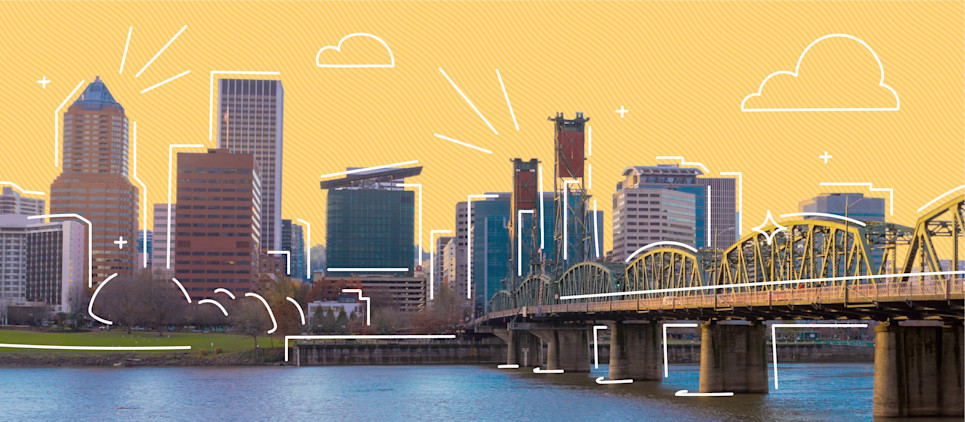What is the real cost of living in Portland, OR?
About 662,549 people call Portland, Oregon, home. Portland is Oregon’s largest city, with roughly 60 percent of the state’s residents. With its resident community of hipsters and outdoor adventurists, the city has earned a reputation as a haven for liberal counterculture. In recent years the technology industry has become a major component of the city’s economy.
Portland’s other main industries include manufacturing, healthcare, and athletic and outdoor apparel. In fact, the city hosts the highest concentration of such companies in the country: Nike, Columbia Sportswear, and Adidas all have headquarters in the metro area.
There is no shortage of things to do in and around Portland, from tasting international cuisine at the city’s famous “food cart pods” (designated areas for food trucks) to perusing the aisles of the world’s largest independent bookstore, Powell’s Books. From Portland, you can also easily drive to nearby scenic areas like Mt. Hood National Forest and the rugged Oregon coast.
Numbeo’s cost of living index, which factors in the cost of consumer goods prices, including groceries, restaurants, transportation, and utilities, scored Portland at 77.74 out of 100 in March 2021. (New York City is the index’s benchmark for most expensive cities, with a score of 100.) When you take rent into consideration, Portland scores 64.71, suggesting the overall cost of living is more expensive than inland major cities like Denver and Austin, but significantly cheaper than coastal cities and nearby tech hubs San Francisco and Seattle.
Payscale.com ranks Portland’s cost of living as 29% higher than the national average. Still, this can vary greatly depending on how much you spend on things like housing and transportation.

Table of contents
Housing: Rental pricesHousing: Home purchase pricesUtilities costFood costTransit costAverage salaryHousing: Rental prices
Close to half of Portland residents rent their homes. In January 2021, the average rent for an apartment was $1,495 (compared to the national average of $1,465).
The most expensive neighborhoods for Portland renters are the Pearl District, Old Town Portland-Chinatown, and the Nob Hill-Northwest District, with average prices ranging from $1,745 to $1,792 per month.
In popular areas like Downtown Portland, Goose Hollow, and Mount Tabor, monthly rents are between $1,439 and $1,557, on average. Portland’s most affordable neighborhoods include Cully, where renters pay an average price of $864 per month, as well as Parkrose, Sumner, and Woodland Park, where typical asking prices are around $1,030 per month—far below the citywide average.
Renters in other major West Coast cities like Los Angeles and San Francisco need double the housing budget that an average Portland renter needs. Consider this the added cost of sunshine: California’s residents typically enjoy warmer, drier weather than their Pacific Northwest neighbors. In Portland, which ranks third on Statista’s list of cities with rainiest days in the country, there are an estimated 164 rainy days per year.
Even if these numbers sound high, living in Portland doesn’t have to be out of reach. Coliving with roommates allows you to spend significantly less than the average cost of solo housing.
Housing: Home purchase prices
Home prices in Portland have risen nearly 53% over the last decade, from a median sale price of $263,000 in March 2011 to $501,224 in March 2021. While Portland housing prices are nearly twice the nationwide median of $269,039, they’re still below the typical home value in some nearby cities in the Pacific Northwest.
In picturesque Seattle, just under three hours north of Portland, the typical home value is around $816,718 (as of March 2021). In Bend, Oregon, which neighbors the Willamette National Forest to Portland’s south, median home values have gone up 14.5% in the last year, with asking prices around $562,588—over $60,000 more than Portland’s average housing cost.
More affordable real estate can be found in neighboring cities within the greater Portland area. In Beaverton, Oregon, and Vancouver, Washington—both less than a 20-minute drive from Downtown Portland—typical home prices can be up to $99,000 less expensive than the Portland median.
Utilities cost
The average monthly utilities bill in Portland is around $188 for basic electricity, heat, gas, and garbage services. Adding internet costs an average of $66 more per month. This is slightly more than San Franciscans or New Yorkers spend on monthly utilities, but still less than residents pay in Seattle, on average. Overall, Portland’s typical utilities cost is roughly $24 above the national average.
Food cost
Portland is home to nearly 3,140 restaurants, bars and coffee shops, as well as 70 breweries—more than any other city on earth. Because the city is widely celebrated for its diverse culinary offerings, dining out here is an expense you’ll want to add to your cost of living calculator.
On average, you can expect to pay around $18 for a one-person meal at an inexpensive restaurant in Portland, and $60 for a three-course meal for two people at a mid-range restaurant. Similar meals in Boston, Los Angeles, New York, and San Francisco will typically be much more expensive.
Portlanders spend an average minimum of $372.35 on monthly groceries, which is higher than the national average of $341.40. However, the entire state of Oregon has no sales taxes—which makes prices in Portland look like a bargain compared to nearby Seattle’s 10.1% sales tax.

Transit cost
Portland is separated into six geographical “quadrants” divided by the Willamette River (which runs south to north). The neighborhoods within each area, such as Northeast or Southwest Portland, are easily walkable and bike-friendly. Still, the entire city is fairly spread out, and many residents own cars for commuting, as well as for outdoor adventures beyond the city.
But having a car in Portland will cost you: According to GasBuddy, the average price for a gallon of gas in Portland is $3.15 as of March 2021. That’s 28 cents more expensive than the $2.87 national average. It’s also worth noting that in many parts of Oregon, including Portland, it’s against the law to pump your own gas.
If you’re considering moving to Portland, you can reduce your overall cost of living by utilizing the city’s public transport system, TriMet, which operates bus, light rail, and commuter trains throughout the metro area. Single rides start at $2.50, and unlimited monthly passes cost $100, which is similar to the average price for a monthly transit pass in Los Angeles.
Average salary
The average annual salary in Portland is $69,000, according to Payscale.com. However, many of Portland’s top employers are companies such as Nike and Intel, where employees earn average salaries between $94,000 and $98,000, and can earn much more depending on seniority and role.
As of July 2020, the minimum wage in Portland is $13.25, which is $1.25 more than Oregon’s standard minimum wage—and nearly double the nationwide minimum of $7.25. Still, income taxes in Oregon are quite high; for Portlanders, the tax rate starts at 5% and rises to almost 10%, depending on how much you earn.
Spending responsibly on rent can help keep your personal finances on track. Shared housing is one of the best ways to lower your rent cost. Bungalow’s homes are designed for roommates, located in the best neighborhoods, and set up for seamless living. Whether you already have roommates or are looking for new ones, there’s a Bungalow with your name on it. Find your Bungalow.
Ready to find your next home?
Move-in ready homes and a built-in community so you can feel at home, together — wherever you are.
Suggested articles




